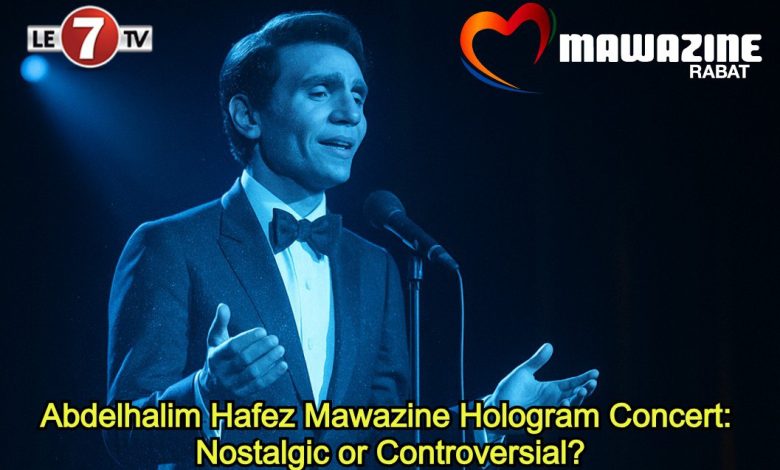Abdelhalim Hafez Mawazine Hologram Concert: Nostalgic or Controversial?
Following his recent birthday, a holographic concert to pay tribute to Abdelhalim Hafez, the legendary Egyptian singer, will be featured at the 20th edition of Mawazine, taking place on June 23 at Rabat’s Mohammed V Theater. The event, which is held under the High Patronage of His Majesty King Mohammed VI, has sparked legal threats from his family and raised questions about digital legacy and artistic consent.

With his birthday having just passed on June 21, organizers of Mawazine thought it fitting to include a world-renowned and beloved figure in the ambassador of Arabic song, Abdelhalim Hafez, in their already stacked roster of stars performing throughout late June, including Nancy Ajram, Kadhem Saher, Shada Hassoun, and many more.
The performance will be live, using holographic technology to generate images of the late singer while playing some of his most popular titles. Though impressive and rarely utilized, this wouldn’t be the first concert of its kind, globally or locally. Holographic performances have been used for surprise appearances by deceased legends such as Michael Jackson at the Billboard Music Awards in 2014, Tupac Shakur at Coachella in 2012, Whitney Houston from 2020 to 2022, and more.
This also wouldn’t be the first occurrence of Mawazine using this technology, as they previously presented a holographic concert for Oum Kalthoum in 2024. Fans were skeptical at first, questioning the ethics and raising the issue of consent. Would Oum Kalthoum have approved of this or consented to her image being used in such a way after her death? But once the performance began, emotions ran high. Fans were unexpectedly tearful and moved by the overwhelmingly realistic performance. It felt as though Oum Kalthoum was really on stage.
But while the first occurrence of a hologram performance went well in Morocco, it is not guaranteed that the second will. Concerns have been raised because Hafez’s family did not consent in any way to the use of his image or voice, claiming that rights to Hafez’s recordings are held exclusively by Mazzika Group, which acquired his entire catalogue in the early 2000s. Hafez’s family has threatened legal action if their wishes are not respected.
However, Mawazine organizers appear to have a solid defense: they state that they obtained all necessary permissions ahead of the official announcement to legally use Hafez’s voice and image.
This leaves us with the following question: Are holographic concerts nostalgic and acceptable, or disrespectful and controversial? Reviews on the matter are heavily mixed. On one hand, some fans consider it a magical experience. Seeing their idols and favorite artists perform again after they had thought it impossible is an indescribable feeling. The realism of the performances has also been applauded repeatedly, and the concerts have been called jaw-dropping.
On the other hand, these performances are seen as soulless and borderline creepy. A big part of concert performances is the artist interpreting their songs differently each time, adding a personal artistic touch. With an automated performance, that part is lost, taking away what makes a concert feel special.
Another issue is the question of the artist’s consent. If they were alive today, would they approve of this? The shows risk turning the artists into brandable ghosts, raising the question of dignity versus monetization.
Regardless of where one stands on the ethics of this digital resurrection, the fact remains: Abdelhalim Hafez’s music still moves hearts, even decades after his passing. Whether live or holographic, his voice continues to echo across generations, reminding us that art, in any form, has the power to bridge time.
Amine Edmar/le7tv








